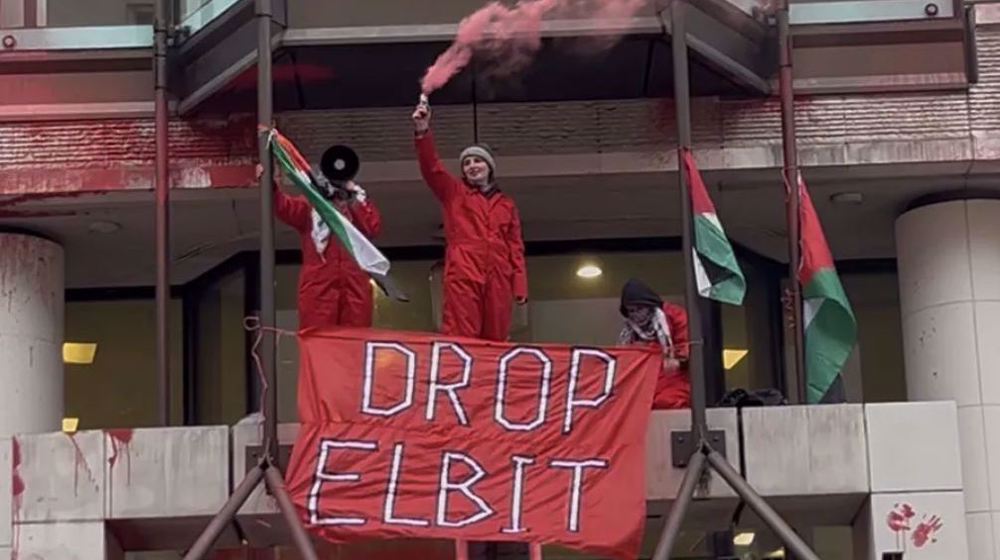Former Israeli president Shimon Peres dies at 93
Former Israeli President Shimon Peres, known as the regime’s “last remaining founding father,” has died almost two weeks after suffering a stroke.
The Sheba Medical Center in Tel Aviv pronounced the 93-year-old dead at 0000 GMT on Wednesday.
He had been rushed to hospital on September 13 following chest pains, an abnormal heartbeat and severe internal bleeding.
While receiving medical care, officials had described his condition as serious, putting him in a medically-induced coma in the intensive care unit.
Over five decades of politicking, Peres held nearly every major office in the regime’s ranks.
He served as foreign minister under his Labor Party rival Yitzhak Rabin, became prime minister between 1984 and 1986, and then again during 1995-96 after Rabin’s death. The politician also served as the regime’s president from 2007 to 2014.
The career also saw him once functioning as the minister for military affairs.
Under Peres’s tenure as president, two full-scale wars were launched against the Israeli-blockaded Gaza Strip, which killed more than 3,700 Palestinians in total.
He, however, slammed as “outrageous” and “one-sided” a United Nations inquiry that blamed Israel for six serious attacks on UN buildings during the first Gaza offensive and said Tel Aviv would not apologize for defending its people.

Two years into his presidency, he surprised even some Israeli politicians by defending Tel Aviv’s regular deadly forays into the enclave.
In 2009, he famously prompted a walkout by then Turkish Prime Minister Recep Tayyip Erdogan on the World Economic Forum in Davos, Switzerland after an angry exchange with the latter concerning Israeli warfare against the strip.
Qana Carnage
While he was in office as prime minister in 1996, the Israeli military shelled a United Nations compound near Qana, a village in southern Lebanon, where hundreds of locals were sheltering. The raid killed 106 people and injured around 116 others.

When asked to explain, Peres said, “We did not know that several hundred people were concentrated in that camp. It came to us as a bitter surprise.”
However, a UN investigation later revealed that the deaths at the Qana base were unlikely to have been the result of an accident.
As director general of the ministry of military affairs in the 1950s, Peres oversaw the development of Israel’s nuclear program with assistance from France.
The Israeli atomic stockpile is now estimated to be holding at some 200-400 warheads, while the regime refuses to confirm or deny its existence under a policy of deliberate ambiguity.
Peres once told The Time that Israel’s Dimona nuclear reactor in the Negev desert, which is used to manufacture nuclear arms, had helped the regime by leading many Arabs to the suspicion that “it’s very hard to destroy Israel.”
Israel claimed existence in 1948 after carrying out a wholesale war against Arab states and capturing massive swathes of Arab land.
A year earlier, Peres had joined the Haganah, the predecessor of the Israeli military. He had been tasked by his mentor David Ben-Gurion, the so-called “primary founder of Israel” and first Israeli premier, with recruitment of personnel and arms purchases.
“As long as there was a danger to the existence of Israel, I was what you would call a hawk,” Peres once said.
His career was also marked by an incessant push to expand the regime’s illegal settlements, which have been mushrooming across the occupied Palestinian territories.
‘Beginning of the end of occupation’
Palestinians, meanwhile, reacted to Peres’ death, blaming him for their suffering in the Israeli-occupied West Bank and blockaded Gaza.
Gaza-based Palestinian resistance movement Hamas said “the Palestinian people are very happy at the passing of this criminal who caused their blood to shed.”
Sami Abu Zuhri, the spokesman for Hamas, said Peres “was the last remaining Israeli official who founded the occupation, and his death is the end of a phase in the history of this occupation and the beginning of a new phase of weakness.”
Palestinian residents of Gaza and the West Bank also slammed the late Israeli politician for the carnage of many of their compatriots.
“It is known that he has killed many Palestinians,” said Halim Jaber, resident of Ramallah in the West Bank.
Zahra Al-Najjar, resident of Gaza, also said “As a Palestinian I feel happy because Shimon Peres and all of them (Israeli leaders) were part of imposing the siege on Gaza and on the Palestinian nation.”

Gaza’s humanitarian crisis deteriorating ‘beyond imagination’: UN chief

UK shared contact details of police, prosecutors with Israel: Report

Hamas condemns Gaza blockade as war crime, demands global action
Yemen warns US, West: We have 8 million fighters ready, may expand our war
Gaza’s humanitarian crisis deteriorating ‘beyond imagination’: UN chief
US announces new Iran sanctions despite ongoing nuclear talks
Iraqi MP files lawsuit against Syria’s leader Julani over 'terrorist' past
Iran urges Germany to probe wartime supply of chemical weapons to Iraq
Over 65,000 children hospitalized for malnutrition as Israel starves Gaza
Hamas condemns Gaza blockade as war crime, demands global action
At ICJ hearings, South Africa says Israel committing genocide with 'impunity'








 This makes it easy to access the Press TV website
This makes it easy to access the Press TV website